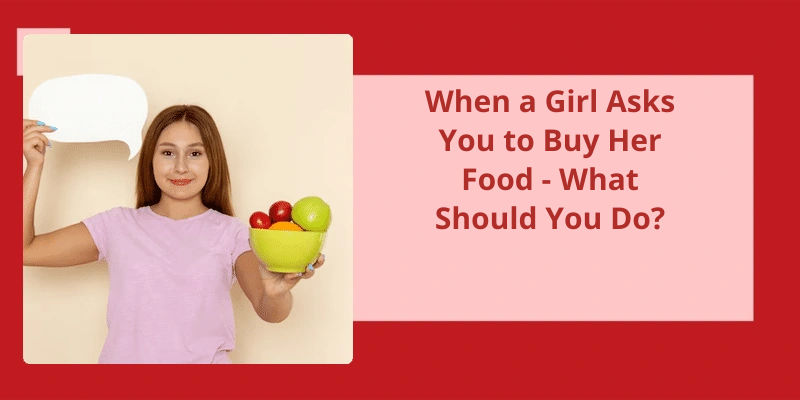Asking someone to buy you food can be interpreted in many ways depending on the circumstances surrounding it. However, when a girl asks you to buy her food, it’s important to consider the context in which the request was made. Is it a friendly gesture between two friends or is there an underlying meaning behind the request? It's important to remember that not all requests for food are created equal. There are many factors that need to be taken into consideration, such as the dynamics between the two parties, the intention behind the request, and the value placed on the act of sharing a meal. It's natural to have questions or concerns about this type of situation, but it's important to approach it with an open mind and a willingness to communicate effectively. So, if you find yourself in a situation where a girl has asked you to buy her food, stay tuned. We'll explore some ways to approach the situation with grace and clarity.
Is Feeding Someone Food Romantic?
Is feeding someone food romantic? The answer to this question is subjective and depends on the context and individuals involved. For many cultures, sharing food is an important way of showing a friendly and harmonious relationship. Couples often use food as a way of bonding and spending quality time together.
At times, feeding another person may indicate a deeper connection as it requires intimacy and trust. The act of feeding another person involves opening oneself up to potential vulnerability and allows the other person to take care of their needs. When done in a romantic relationship, it can symbolize love and mutual respect for each other.
Other Romantic Gestures That Involve Food, Such as Cooking a Meal Together or Surprise Picnics
A couple can enhance their romance by engaging in food-related activities, such as cooking a meal together or organizing a surprise picnic. These gestures are thoughtful and personalized, showing affection and care for one another.
The nuances of human interactions can be tricky to navigate, especially when it comes to the topic of dating. For example, is simply sharing a meal with someone enough to classify it as a date? While it’s true that dining alone with a woman can suggest romantic interest, there are other factors to consider before jumping to conclusions. Let’s examine some of the subtleties involved in this common scenario.
Is Eating With Someone a Date?
Moreover, if you specifically asked her out to dinner or if the evening involves other activities such as going to a movie or a show, then it’s likely to be considered a date. On the other hand, if the woman is a close friend or someone you regularly hang out with, a dinner together might simply be seen as a friendly get-together rather than a romantic pursuit.
Another factor to consider is the intention behind the meal. If your primary objective is to get to know the person better and explore the possibility of a romantic relationship, then it can certainly be considered a date. However, if the meal is simply an excuse to catch up with an old friend or discuss business matters, then it’s less likely to be viewed as a date.
Additionally, the atmosphere and ambiance of the restaurant can also play a part in determining whether or not it’s a date. If you choose a fancy restaurant with a romantic setting, then this may indicate that it’s a more formal and romantic occasion. However, if you opt for a casual restaurant or a fast food joint, it may indicate that you’re simply hanging out as friends.
It’s also important to communicate your intentions clearly. If you’re interested in the person romantically, it’s essential to make that clear from the outset. This can help to avoid confusion and ensure that both parties are on the same page. If your dinner companion isn’t interested in a romantic relationship, it’s best to respect their wishes and move on.
Source: How is a dinner date supposed to be different from just …
Knowing how to order food politely is an important part of eating out or ordering takeout. While there are several ways to ask for a dish, from formal to informal, it’s important to remember that politeness goes a long way in any situation. Here are some tips to help you navigate how to ask for food in a polite manner.
How Do You Politely Ask for Food?
Asking for food is something that’s necessary in our day-to-day interactions. However, it’s important that we do so in a way that’s polite and respectful to the people who’re serving us. There are a number of ways that you can politely ask for food, and it’s important to choose the right one depending on the situation you find yourself in.
One of the most common ways to ask for food is to say “Could I’ve the (dish name), please?”. This is a polite and formal way of making your request and shows that you’re being respectful to the person serving you. It’s particularly suitable for formal settings such as restaurants or business meetings.
If you’re in a more casual setting, you might choose to say “The (dish name), please.”. This is a neutral option that’s suitable for informal settings such as cafes or fast food restaurants.
In more informal situations, you might choose to use more direct language when making your request for food. For example, you might say “I want the (dish name).” or “Give me the (dish name).”. Being too direct or demanding can come across as rude or impolite.
By choosing the right language and tone of voice, we can make our requests for food in a way that’s appropriate for the situation we find ourselves in. Whether you’re in a formal or informal setting, taking the time to be respectful and polite can go a long way in making your request for food a positive and pleasant experience for everyone involved.
Conclusion
In conclusion, it’s important to acknowledge that different social situations require different levels of attention and consideration. While some girls requesting food from men may be genuine in their request, it’s essential to approach such requests with caution and humility. Men shouldn’t feel obliged to buy food for girls just because they’ve been asked to do so, but should instead consider what their intentions are and whether or not the request is appropriate. Ultimately, treating others with dignity and respect, and being mindful of our actions and their impact on others, should always be our guiding principles in all social interactions.






